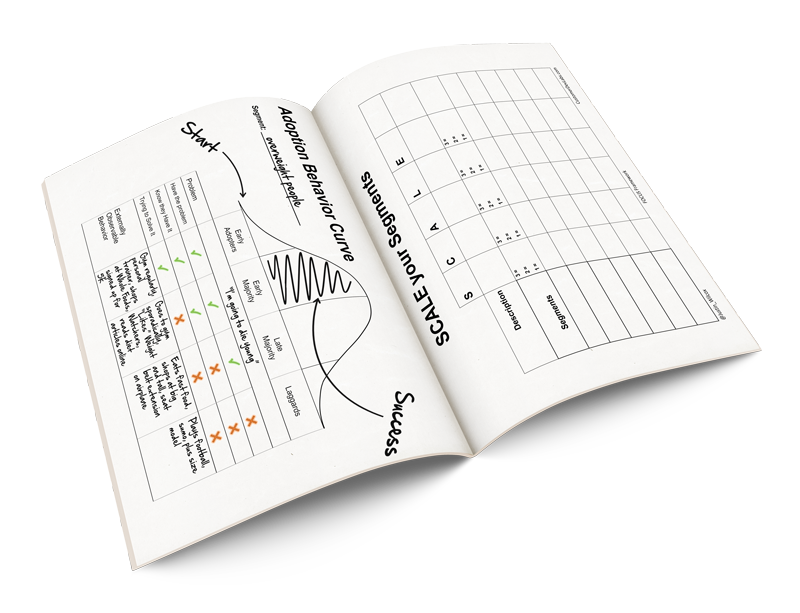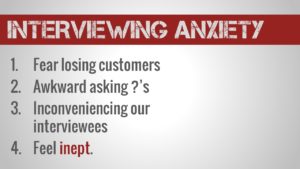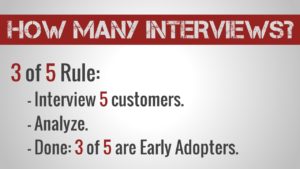When my mentor asked me for specific quotes from “potential customers” to demonstrate demand in an investor presentation the next day, I was up S*&% creek.
We don’t want investors “guessing” whether or not there’s demand for our products, but we don’t have time to walk through every single experiment and interview we’ve done during a pitch. What we can do though, is share the excitement, demand, and desperation for our product via real customer quotes:
“This is Super needed in the marketplace. We will pay you for this” – Impact Investor*
“Our members will position themselves for better jobs if they have skills-based volunteering experience” – Career site for impact professionals*
“Existing programs are way too expensive, and my frustration in trying to find a legitimate opportunity could cause me to do nothing.” – Professional interested in skills-based travel volunteering*
“We can’t find the volunteers we need in order to grow our social enterprise.” – Potential hosting enterprise in Turkey*
*Names excluded for this blog post. Permission was specific to being used in presentation decks.
Make sure to respect your customers (and potential ones).
Unfortunately, through all my early customer interviews I had failed to collect quality quotes (until now). I know I heard some great quotes, and probably scratched some down on paper, but I did a terrible job at documenting them, and I never asked for permission to use them.
I needed new customers to interview, FAST, and I needed enough quotes from them to ensure that I had a pool of HIGH QUALITY quotes. Sure, I could have gone back to people I interviewed, but I decided to use this as an opportunity to reach more people and do more validation.
And as my new venture, MovingWorlds, is working to effectively scale international, skills-based volunteering, I needed quotes about professionals who, in their own words, expressed needs that our solution addresses.
Using Quora to Find Potential Customers and Validate Our Problem and Solution Hypotheses
I was blown away how easy it was to find people with the EXACT challenges we were trying to solve. I used Quora in 2 ways
- Find people with relevant questions, and react to their posts
- Asked for specific quotes about my product
Finding people was easy. I started typing in “Skills-based volunteering” and before I could finish Quora was suggesting a myriad of topics that were addressing both parts of my marketplace – people looking for opportunities, and enterprises looking for volunteers (as well as companies looking to promote skills-based volunteering:
I was hoping for 2 things from finding people on Quora: first, to get feedback directly in Quora, and also to direct some traffic to a survey.
After I looked through Quora for a few minutes to better understand that types of questions and answers people were giving about this skills-based volunteering topic, I went to SurveyMonkey and setup a survey to capture the data I needed. I was then able to leave comments on Quora, and in exchange, ask for people to take few moments to give me feedback on Quora, and in my survey.
NOTE: Be respectful about searching for feedback here. People come to Quora for answers, not for spammy trawlers.
Here is an example of how I responded to a question so that I was still offering valuable feedback, but also asking for the opportunity to get a survey response, and maybe even a phone interview:
In addition to survey responses and comments on Quora, I also received personal messages as follow-up.
In a relatively short period of time I was able get useful quotes that I needed to use as anecdotes and proof points in my pitch deck, find new customers to interview, better understand customer needs, and find matches for the next phase: concierge MVP (I’ll write more on concierge testing, later).
Using Mechanical Turk to Get Customer Validation Quotes
I didn’t have the time or resources to setup extensive customer interviews through Mechanical Turk like Justin wrote about on a previous post, so instead, I setup a quick survey to do the following:
- Only capture professionals willing to volunteer their time
- Make sure respondents were from our target demographic (from the US, had a professional skill, and attained a college degree)
- Get quotes about challenges and opportunities for finding skills-based volunteering opportunities abroad
Step 1: Setup survey
I used SurveyMonkey and added qualifier questions to ensure respondents weren’t faking it. Surveyors got bounced with a “reject” code if they didn’t have the right education level or live in the right place. “Trick” questions like ‘age’ and ‘location’ and ‘date of birth’ were included to cross-check data in case people were trying to spam the system (e.g. ask for age on one page, and then ask for date of birth on another, if they don’t match, its most likely worthless data)
Step 2: Setup HITs in Mechanical Turk.
I used the following project (screen shot below) to get people for the survey. I found that adding qualifiers in the ask produced better results. In this case, I had two main qualifiers:
- Must be a resident of the U.S.A. and have at least a Bachelor’s degree. I then confirmed these facts in the survey with specific questions (e.g. where do you live and what is your highest level of education achieved)
- Adding a line “Important: Be sure to read each question carefully. Randomly answering questions will be detected and will result in rejection of the HIT” also helped improve results
You can view the survey by following this link if you want to see the exact questions. Here is a screen shot of the project request on Mechanical Turk:
Here is the code for Mechanical Turk project request that created the field above:
<h3>Answer a <5 min survey about international travel and volunteering</h3>
<div class=”highlight-box”>We are conducting a survey to better understand international travel and volunteering habits of people living in the US. We need to understand your opinion about professionals who want to travel and/or donate their expertise to make the world a better place. Select the link below to complete the survey. At the end of the survey, you will receive a code to paste into the box below to receive credit for taking our survey.
<p>In order to qualify for this survey, you <i><b>must </b></i>be from and/or living in the United States, <i><b>and </b></i>have achieved at least a Bachelor’s degree.</p>
</div>
<p>Survey link: <a href=”https://www.surveymonkey.com/s/VolunteeringAbroad” target=”_blank”>https://www.surveymonkey.com/s/VolunteeringAbroad</a></p>IMPORTANT: Be sure to read each question carefully. Randomly answering quesitons will be detected and will result in rejection of the HIT.
<p>Provide the survey code here:</p>
<p><input type=”text” size=”10″ id=”Q2age” name=”Q2age” /></p>
<p><style type=”text/css”>
<!–
.highlight-box { border:solid 0px #98BE10; background:#FCF9CE; color:#222222; padding:4px; text-align:left; font-size: smaller;}
–>
</style></p>
<p> Watch the video on our home page to learn more: <a href=”http://www.movingworlds.org” target=”_blank”>http://www.movingworlds.org</a></p>
In the survey, in addition to asking for people to provide a quote if they were interested in skills-based volunteering, I also asked for email addresses if I could follow-up to schedule an interview. I got nearly a 50% response rate – within 1 day – from qualified leads to schedule an interview:
I have not yet had the time to follow-up with all my survey responders, but I have gotten some useful feedback and a great list of qualified people to interview and get quotes from.
Extra Credit Tip:
Don’t make the same mistake I did and not have powerful quotes and anecdotes ready to go when potential partners are asking for them :)
For all of you early on in the interview process, make sure to collect quality quotes (and get permission to share them) from the people you interview. To help organize this, my team and I setup a Google Form that made it easy to capture quotes. We could either submit ourselves, or invite others to leave us a quote through a Google Form. Key fields: Quote, Date, First Name, Last Name, Permission to Publish (Yes, No, maybe – get confirmation for each use), Email, OK to follow-up for more quotes (Yes, No). Looks like this:
Join the experiment – want more ideas on validating your business model and sharing that validation with others? Subscribe via Email or RSS for our next update: How to Interview Complete Strangers.











